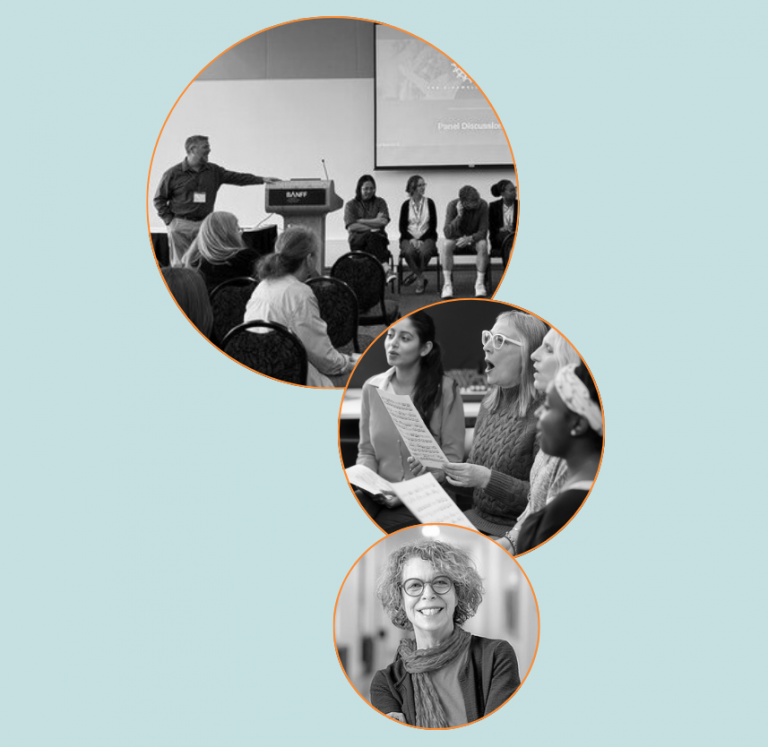SingWell's
3RD ANNUAL
Research
Symposium
Friday, November 1, 2024
10am – 5pm ET
Online + In-Person at Toronto Metropolitan University

Join us for a full day and catered lunch as we celebrate the research strides we have made in the last year and hear from colleagues leading new discoveries on how group singing can promote wellbeing.
FREE ADMISSION
Event Agenda
All times are listed in Eastern Standard Time (GMT – 5:00)
9:30 – 10:00 AM
Registration for in-person attendees
10:00 – 10:30 AM
Opening remarks from SingWell’s Scientific Director Frank Russo, Ph.D.
SingWell project updates, led by Lead Researcher Arla Good, Ph.D
10:30 – 11:30 AM
keynote speaker
Isabelle Peretz, Ph.D.
Professor, Université de Montréal
Bridging Divides Scholar of Excellence
Sharing music with new immigrants: Learning and connecting through song
SHORT BREAK
11:40 – 11:55 AM
Research Presentations: Breathing Disorders, pt. I
Effects of a hybrid group-singing program for older adults with breathing disorders on lung health, functional capacity, cognition, quality of life, communication skills, and social inclusion – a feasibility pilot study
Nicole Marquis & Louise Drouin | University of Sherbrooke
12:00 – 12:30 PM
Research Presentations: Choir Directors’ Best Practices
Group singing to support social well-being and communication: Best practices of singing leaders
Kathy Matkin-Clapton, Arla Good, Frank A. Russo | Toronto Metropolitan University
Laurier Fagnan | University of Alberta
Jane Gosine | Memorial University
What are the skills, attributes and knowledge for group singing facilitators?: A systematic review
Yoon Irons | University of Derby
12:30 – 1:45 PM
Lunch break + student poster session @ TMU
Fidaa Akrout | Université de Montréal
Narges Bayat | University of Ottawa
Aidan Boucher | Toronto Metropolitan University
Bridget Boyle | Toronto Metropolitan University
Adiel Mallik | Toronto Metropolitan University
Margaret Orford | University of Prince Edward Island
1:45 – 2:15 PM
Research Presentations: Group Singing Mechanisms
Group singing versus solo singing: An update
Dawn Merrett | Université de Montréal
Laurier Fagnan | University of Alberta
Jane Gosine | Memorial University
Group singing and its effect on cortisol, oxytocin and pain threshold in PD patients
Adiel Mallik, Tara Raessi, Arla Good, Alex Pachete, & Frank A. Russo | Toronto Metropolitan University
2:20 – 2:50 PM
Research Presentations: Methodology
Saliva collection: Feel less stressed about measuring stress
Alex Pachete | Toronto Metropolitan University
Updates from the hearing loss multisite and recommendations on conducting a SingWell Project multisite randomized controlled trial
Chi Yhun Lo, Arla Good, Frank A. Russo | Toronto Metropolitan University
Benjamin R. Zendel | Memorial University
SHORT BREAK
3:10 – 3:55 PM
Research Presentations: Parkinson’s Disease
Current research evidence of the effectiveness of singing for people living with Parkinson’s
Yoon Irons | University of Derby
Automatic computation of singing scores based on detected frequencies
Lena Heng, Chinemerem Mbonu, Annabel J. Cohen | University of Prince Edward Island
Virtually together: Do you hear what I hear? A singing collective unites
Tara Gaertner, Cynthia Friesen, Silke Appel Cresswell, Peter Gouzouasis, Gael Hernandez Palmer, Mannat Sidhu, Julia Ulehla, Rena Sharon | University of British Columbia
Debra Sheets | University of Victoria
4:00 – 4:15 PM
Research Presentations: Breathing Disorders, pt. II
Group singing for people with breathing disorders
Merrill Tanner | University of Alberta
SHORT BREAK
4:25 – 5:00 PM
Research Presentations: Microeconomics & Social Prescription
The health, social and economic benefits of group singing
Study 1: Arla Good, Frank A. Russo | Toronto Metropolitan University
Amy Clements-Cortés | University of Toronto
Kate Dupuis | Seneca College
Study 2: Arla Good, Frank A. Russo | Toronto Metropolitan University
Rebecca Barnstaple | University of Guelph
Jane Gosine | Memorial University
Pathways to implementing singing on prescription
Jane Gosine, Hannah Sparkes | Memorial University
Rebecca Barnstaple | University of Guelph
Arla Good | Toronto Metropolitan University
CLOSING REMARKS
Keynote
“Sharing music with new immigrants: learning and connecting through songs”
Canada has long prided itself on being a welcoming society, yet our current methods for integrating new immigrants into our communities often fall short. As a solution, we propose group singing as an enjoyable approach that not only addresses communication barriers but also fosters integration and promotes overall well-being.
ABOUT DR. ISABELLE PERETZ
Isabelle Peretz, Ph.D., is a professor of Psychology at the University of Montreal, the co-holder of a Casavant Research chair in neurocognition of music, and a Bridging Divides Scholar of Excellence at Toronto Metropolitan University. Her research focuses on the musical potential of ordinary people, its neural correlates, its heritability and its specificity relative to language. She is renowned for her work on congenital and acquired musical disorders (amusia) and on the biological foundations of music processing in general. She has published over 470 scientific papers on a variety of topics in neurocognition of music, from perception, memory, and emotions to singing and dancing. Dr. Peretz has been awarded several prizes for her research in addition to being named a Member of the Order of Canada, an Officer of the Order of Quebec, a fellow of the Royal Society of Canada, of the American Psychological Association, and now an international member of the U.S. National Academy of Sciences.
About SingWell
Based at Toronto Metropolitan University, SingWell brings together an international network of leading
researchers who are examining the impacts of group singing on wellbeing and communication function. We are also a hub for partners across Canada with a role to play in activating the power of group singing for wellbeing and communication, including speech-language pathologists, second language teachers, newcomer organizations, music therapists, choral groups, leaders in social prescribing, and people living with communication challenges and the organizations who support them.
Our mission is to help people harness the power of group singing to promote wellbeing and communication.